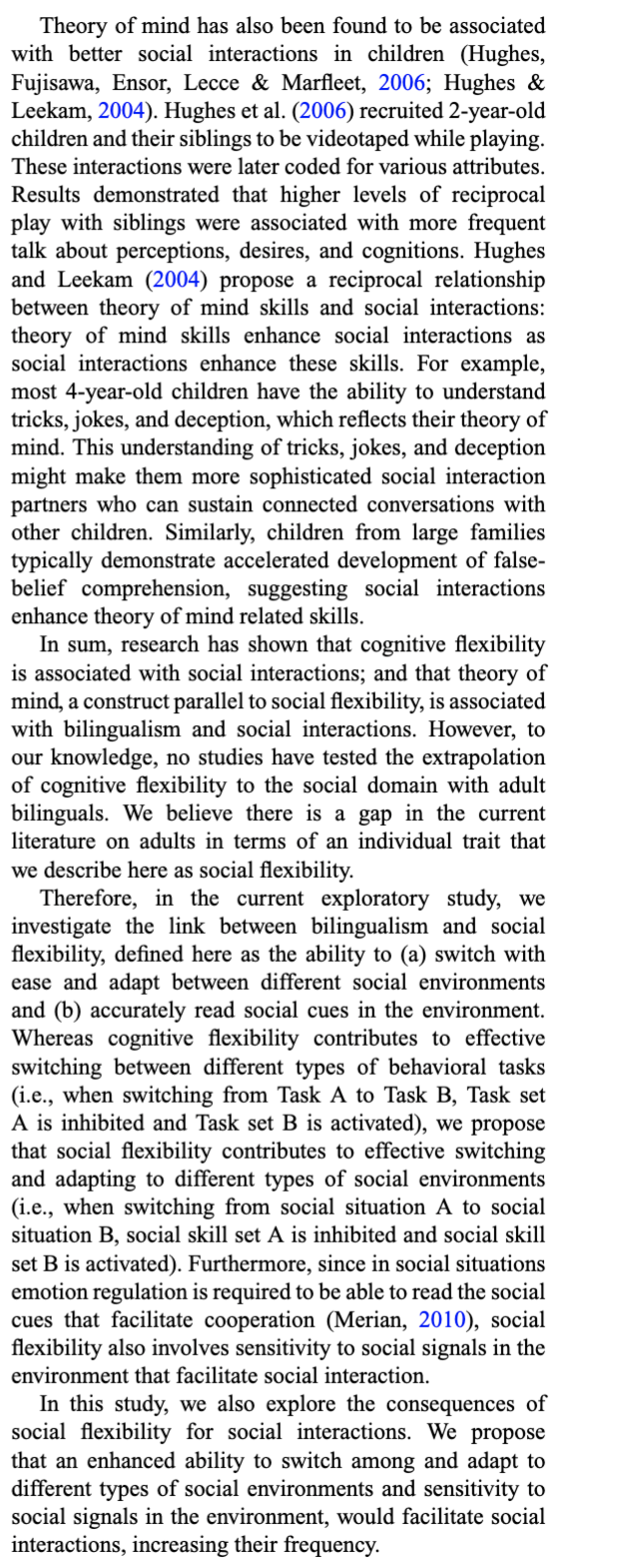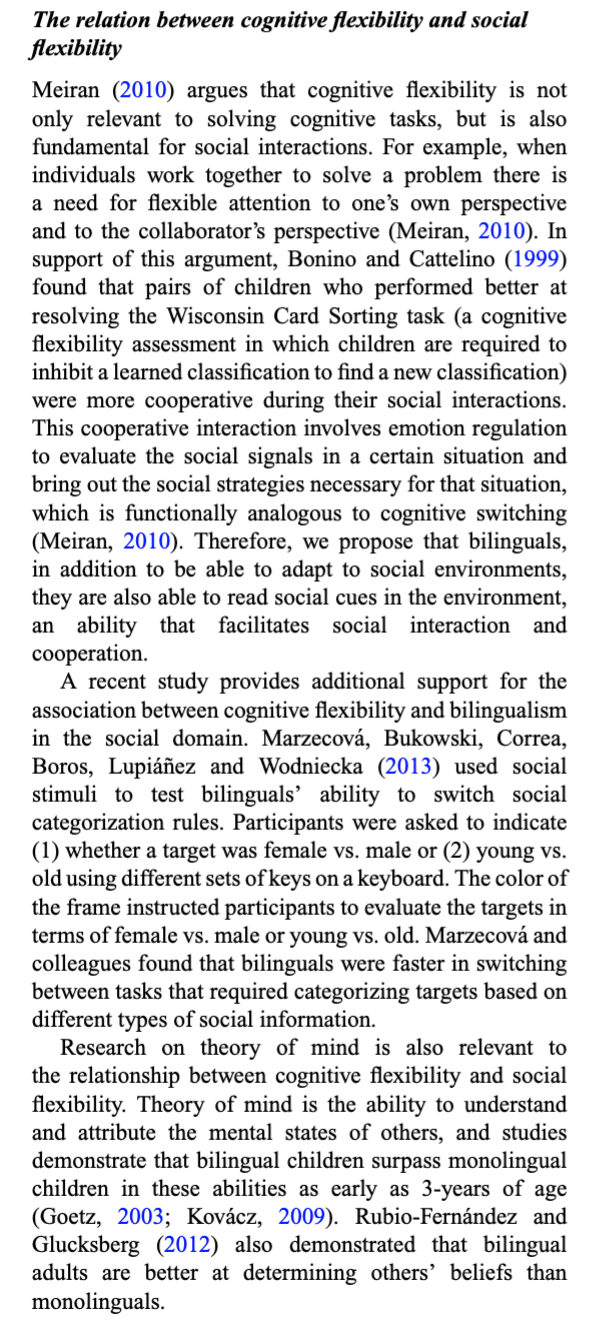Chapter8: Rites Of Passage: Physical And Cognitive Development During Adolescence
Section8.3: Information Processing During Adolescence
Problem 5TY
Related questions
Question
100%
What is the summary of this paragraph?

Transcribed Image Text:Theory of mind has also been found to be associated
with better social interactions in children (Hughes,
Fujisawa, Ensor, Lecce & Marfleet, 2006; Hughes &
Leekam, 2004). Hughes et al. (2006) recruited 2-year-old
children and their siblings to be videotaped while playing.
These interactions were later coded for various attributes.
Results demonstrated that higher levels of reciprocal
play with siblings were associated with more frequent
talk about perceptions, desires, and cognitions. Hughes
and Leekam (2004) propose a reciprocal relationship
between theory of mind skills and social interactions:
theory of mind skills enhance social interactions as
social interactions enhance these skills. For example,
most 4-year-old children have the ability to understand
tricks, jokes, and deception, which reflects their theory of
mind. This understanding of tricks, jokes, and deception
might make them more sophisticated social interaction
partners who can sustain connected conversations with
other children. Similarly, children from large families
typically demonstrate accelerated development of false-
belief comprehension, suggesting social interactions
enhance theory of mind related skills.
In sum, research has shown that cognitive flexibility
is associated with social interactions; and that theory of
mind, a construct parallel to social flexibility, is associated
with bilingualism and social interactions. However, to
our knowledge, no studies have tested the extrapolation
of cognitive flexibility to the social domain with adult
bilinguals. We believe there is a gap in the current
literature on adults in terms of an individual trait that
we describe here as social flexibility.
Therefore, in the current exploratory study, we
investigate the link between bilingualism and social
flexibility, defined here as the ability to (a) switch with
ease and adapt between different social environments
and (b) accurately read social cues in the environment.
Whereas cognitive flexibility contributes to effective
switching between different types of behavioral tasks
(i.e., when switching from Task A to Task B, Task set
A is inhibited and Task set B is activated), we propose
that social flexibility contributes to effective switching
and adapting to different types of social environments
(i.e., when switching from social situation A to social
situation B, social skill set A is inhibited and social skill
set B is activated). Furthermore, since in social situations
emotion regulation is required to be able to read the social
cues that facilitate cooperation (Merian, 2010), social
flexibility also involves sensitivity to social signals in the
environment that facilitate social interaction.
In this study, we also explore the consequences of
social flexibility for social interactions. We propose
that an enhanced ability to switch among and adapt to
different types of social environments and sensitivity to
social signals in the environment, would facilitate social
interactions, increasing their frequency.

Transcribed Image Text:The relation between cognitive flexibility and social
flexibility
Meiran (2010) argues that cognitive flexibility is not
only relevant to solving cognitive tasks, but is also
fundamental for social interactions. For example, when
individuals work together to solve a problem there is
a need for flexible attention to one's own perspective
and to the collaborator's perspective (Meiran, 2010). In
support of this argument, Bonino and Cattelino (1999)
found that pairs of children who performed better at
resolving the Wisconsin Card Sorting task (a cognitive
flexibility assessment in which children are required to
inhibit a learned classification to find a new classification)
were more cooperative during their social interactions.
This cooperative interaction involves emotion regulation
to evaluate the social signals in a certain situation and
bring out the social strategies necessary for that situation,
which is functionally analogous to cognitive switching
(Meiran, 2010). Therefore, we propose that bilinguals,
in addition to be able to adapt to social environments,
they are also able to read social cues in the environment,
an ability that facilitates social interaction and
cooperation.
A recent study provides additional support for the
association between cognitive flexibility and bilingualism
in the social domain. Marzecová, Bukowski, Correa,
Boros, Lupiáñez and Wodniecka (2013) used social
stimuli to test bilinguals' ability to switch social
categorization rules. Participants were asked to indicate
(1) whether a target was female vs. male or (2) young vs.
old using different sets of keys on a keyboard. The color of
the frame instructed participants to evaluate the targets in
terms of female vs. male or young vs. old. Marzecová and
colleagues found that bilinguals were faster in switching
between tasks that required categorizing targets based on
different types of social information.
Research on theory of mind is also relevant to
the relationship between cognitive flexibility and social
flexibility. Theory of mind is the ability to understand
and attribute the mental states of others, and studies
demonstrate that bilingual children surpass monolingual
children in these abilities as early as 3-years of age
(Goetz, 2003; Kovácz, 2009). Rubio-Fernández and
Glucksberg (2012) also demonstrated that bilingual
adults are better at determining others' beliefs than
monolinguals.
Expert Solution
Introduction:
- A crucial component of human cognition and behavior is cognitive and social flexibility.
- Cognitive flexibility is the capacity to change one's thoughts and behavior in response to environmental changes and to think in alternative ways.
- Social flexibility is the capacity to adapt behavior in social contexts to the demands of the circumstance and to effectively interact with others by recognizing social cues, taking into account opposing viewpoints, and effectively managing relationships.
Step by step
Solved in 2 steps

Knowledge Booster
Learn more about
Need a deep-dive on the concept behind this application? Look no further. Learn more about this topic, biology and related others by exploring similar questions and additional content below.Recommended textbooks for you


Biology (MindTap Course List)
Biology
ISBN:
9781337392938
Author:
Eldra Solomon, Charles Martin, Diana W. Martin, Linda R. Berg
Publisher:
Cengage Learning

Health Safety And Nutrition F/Young Child
Health & Nutrition
ISBN:
9781305144767
Author:
MAROTZ
Publisher:
Cengage


Biology (MindTap Course List)
Biology
ISBN:
9781337392938
Author:
Eldra Solomon, Charles Martin, Diana W. Martin, Linda R. Berg
Publisher:
Cengage Learning

Health Safety And Nutrition F/Young Child
Health & Nutrition
ISBN:
9781305144767
Author:
MAROTZ
Publisher:
Cengage